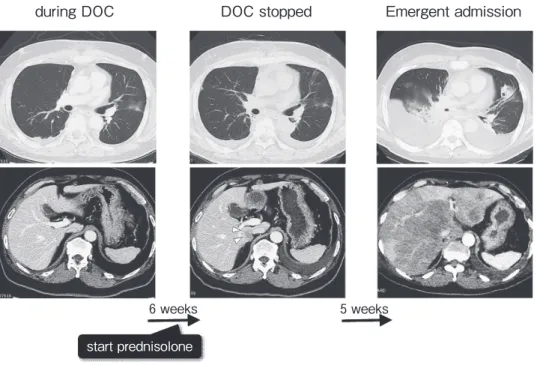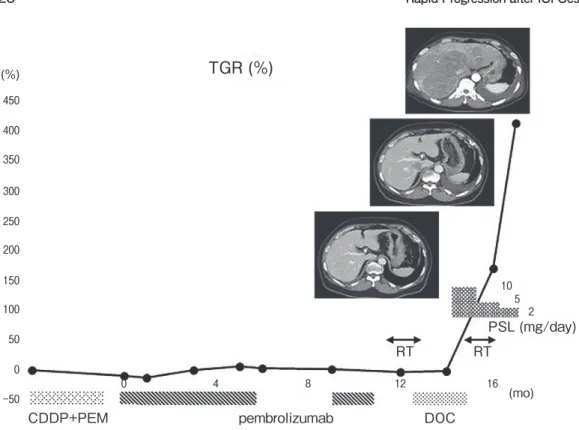P
rogrammed cell death 1 (PD-1) and programmed cell death ligand 1 (PD-L1) inhibitors are cur-rently the standard treatments for advanced NSCLC. Unlike conventional therapies, immune checkpoint inhibitors (ICIs) such as PD-1/PD-L1 inhibitors some-times induce atypical tumor responses including pseu-doprogression and hyperprogressive disease (HPD). HPD is defined as a greater than two-fold increase in the tumor growth rate (TGR) of patients exhibiting disease progression [1,2]. HPD is caused not only by PD-1/ PD-L1 inhibitors but also, less frequently, by cytotoxic T lymphocyte associated antigen-4 (CTLA-4) inhibitors [3]. HPD is usually observed soon after prescription of immune checkpoint inhibitors [4]; to the best of our knowledge, there has been no report on late-onset HPD. We here report a case of late-onset rapid disease progression of advanced NSCLC at 5 months afterces-sation of pembrolizumab; the disease course was thus distinct from conventional HPD.
Case
A male in the sixth decade of life was diagnosed with advanced pulmonary adenocarcinoma; the PD-L1 tumor proportion score was 5%. The progression rate was relatively mild; little progression was evident for 2 months prior to treatment commencement. Pembrolizumab was prescribed as a second-line treatment following platinum doublet chemotherapy. This significantly inhibited tumor growth for 11 months, despite a 3-month cessation of therapy because of immune-re-lated adverse events (irAEs). Then, sternal and verte-bral metastases developed. Docetaxel was administered as a third-line therapy for 4 months; the pleural effu-sion increased slightly and a small liver metastasis Acta Med. Okayama, 2020
Vol. 74, No. 5, pp. 423-425
CopyrightⒸ 2020 by Okayama University Medical School.
http ://escholarship.lib.okayama-u.ac.jp/amo/
Case Report
Rapid Disease Progression of Advanced Non-small Cell Lung Cancer
Five Months after Cessation of Pembrolizumab
Atsuko Hirabae
a, Eiki Ichihara
a*, Ryota Sunami
a, Moeko Ota
a, Yoshitaka Iwamoto
a,
Yoshinobu Maeda
b, and Katsuyuki Kiura
aaDepartment of Allergy and Respiratory Medicine, Okayama University Hospital,
bDepartment of Hematology, Oncology and Respiratory Medicine, Okayama University Graduate School of Medicine,
Dentistry and Pharmaceutical Sciences, Okayama700-8558, Japan
We report a case of late-onset hyperprogressive disease after cessation of a PD-1 inhibitor. A male was diag-nosed with metastatic lung adenocarcinoma with little progression for 2 months before treatment. He received pembrolizumab as a second-line treatment and was subsequently prescribed docetaxel for 3 months until a slight increase in pleural effusion. At the time of progression to docetaxel, he commenced prednisolone because of immune-system-related diarrhea. After that, his general condition rapidly worsened with severe fatigue and hypoxia. Computed tomography revealed a massive increase of pleural effusion and replacement of almost the entire liver with cancer over a period of 5 weeks.
Key words: lung cancer, immune checkpoint inhibitors, pembrolizumab, hyperprogression
Received January 20, 2020 ; accepted May 26, 2020.
*Corresponding author. Phone : +81-86-235-7227; Fax : +81-86-232-8226
developed. Just prior to docetaxel cessation, he com-menced oral prednisolone because of sustained immune system-related grade 2 diarrhea over 1 month in dura-tion. Although the diarrhea disappeared within a few days of prednisolone prescription, his general condition rapidly worsened, accompanied by severe fatigue, and he underwent emergency hospitalization because of hypoxia. Contrast-enhanced computed tomography showed that the pleural effusion had increased mas-sively and almost the entire liver was replaced with cancer over 5 weeks; the progression rate had been relatively slow prior to prednisolone commencement (Fig.1 and Fig.2). Pleurocentesis revealed a class V adenocarcinoma, confirming that progression was attributable to lung cancer.
Discussion
We experienced a case of rapid disease progression of advanced NSCLC 5 months after cessation of pem-brolizumab. The disease course seemed to accelerate greatly (considering the prior progression rate) (Fig.2); we diagnosed this as HPD caused by prior pembroli-zumab. Our case differs from conventional HPD patients in two ways. One is that HPD developed after pembrolizumab cessation, rather than during
treat-ment. PD-1 inhibitors bind to lymphocytes for at least several months after drug cessation [5], and may thus exert various effects long-term. Prior to HPD develop-ment, our patient developed sustained diarrhea caused by irAEs, and required steroid therapy, suggesting that pembrolizumab remained in the body for a long time after drug cessation. The other unique feature of our current case is that the patient initially responded to pembrolizumab before developing HPD. All previously reported HPD cases exhibited rapid progression in the absence of any response to PD-1/PD-L1 inhibitors. Although the precise mechanism of HPD remains unclear, one hypothesis is that HPD may be caused by a change in polarization of immunosuppressive cells modulated by PD-1/PD-L1 inhibitors [6]. In our cur-rent case, disease progression seemed to accelerate after steroid therapy for diarrhea (Fig.1). Such therapy might have modulated immune cell polarization, caus-ing formerly immuno-activatcaus-ing cells to become immu-nosuppressive. We propose that steroid therapy runs a risk of triggering late-onset HPD phenomena.
In conclusion, we experienced a case of rapid dis-ease progression of advanced NSCLC 5 months after cessation of pembrolizumab. We propose that this be considered a case of late-onset HPD after cessation of immune checkpoint therapy.
424 Hirabae et al. Acta Med. Okayama Vol. 74, No. 5
during DOC DOC stopped Emergent admission
6 weeks 5 weeks
start prednisolone
References
1. Champiat S, Dercle L, Ammari S, Massard C, Hollebecque A, Postel-Vinay S, Chaput N, Eggermont A, Marabelle A, Soria JC and Ferté C: Hyperprogressive Disease Is a New Pattern of Progression in Cancer Patients Treated by Anti-PD-1/PD-L1. Clin Cancer Res (2017) 23: 1920-1928.
2. Ferrara R, Mezquita L, Texier M, Lahmar J, Audigier-Valette C, Tessonnier L, Mazieres J, Zalcman G, Brosseau S, Le Moulec S, Leroy L, Duchemann B, Lefebvre C, Veillon R, Westeel V, Koscielny S, Champiat S, Ferté C, Planchard D, Remon J, Boucher ME, Gazzah A, Adam J, Bria E, Tortora G, Soria JC, Besse B and Caramella C: Hyperprogressive Disease in Patients With Advanced Non-Small Cell Lung Cancer Treated With PD-1/ PD-L1 Inhibitors or With Single-Agent Chemotherapy. JAMA Oncol (2018) 4: 1543-1552.
3. Kato S, Goodman A, Walavalkar V, Barkauskas DA, Sharabi A
and Kurzrock R: Hyperprogressors after Immunotherapy: Analysis of Genomic Alterations Associated with Accelerated Growth Rate. Clin Cancer Res (2017) 23: 4242-4250.
4. Frelaut M, Le Tourneau C and Borcoman E: Hyperpression under Immunotherapy. Int J Mol Sci (2019) 20: pii: E2674.
5. Osa A, Uenami T, Koyama S, Fujimoto K, Okuzaki D, Takimoto T, Hirata H, Yano Y, Yokota S, Kinehara Y, Naito Y, Otsuka T, Kanazu M, Kuroyama M, Hamaguchi M, Koba T, Futami Y, Ishijima M, Suga Y, Akazawa Y, Machiyama H, Iwahori K, Takamatsu H, Nagatomo I, Takeda Y, Kida H, Akbay EA, Hammerman PS, Wong KK, Dranoff G, Mori M, Kijima T and Kumanogoh A: Clinical implications of monitoring nivolumab immu-nokinetics in non-small cell lung cancer patients. JCI Insight (2018) 3: pii: 59125.
6. Champiat S, Ferrara R, Massard C, Besse B, Marabelle A, Soria JC and Ferté C: Hyperprogressive disease: recognizing a novel pattern to improve patient management. Nat Rev Clin Oncol (2018) 15: 748-762.
October 2020 Rapid Progression after ICI Cessation 425
(%) 450 400 350 300 250 200 150 100 50 0 -50 TGR (%)
CDDP+PEM pembrolizumab DOC
0 4 8 12 16 10 5 2 (mo) RT RT PSL (mg/day)

